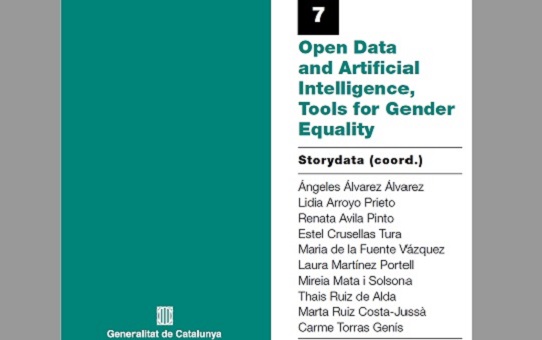The Secretariat of Transparency and Open Government of the Government of Catalonia has published the seventh volume in its “Open Government” collection, titled “Open Data and Artificial Intelligence,Tools for Gender Equality”.
GenTIC researcher Lidia Arroyo is one of the ten leading women who have been interviewed in this book to provide insight into the need to apply a gender perspective to data opening and the use of artificial intelligence. In the book, Lidia Arroyo highlights the need to push for the disaggregation of data by sex and count on standardized indicators with a gender perspective in order to implement sound public policies. “We need to understand what data we have to assess the implications of implementing gender policies. It’s not a question of favouring women but of anticipating what effect those policies will have on inequality”, she affirms.
On the other hand, Lidia Arroyo explains the scope and aims of the Data COVID Gender project, an open data initiative that she is leading aimed at carrying out a cross-sectional and intersectional analysis of the incidence of Covid-19 through a gender lens. Funded by the Catalan Agency for Health Quality and Assessment (AQuAS), the Data COVID Gender project is carried out by Gender and ICT in collaboration with the Barcelona Open Data Initiative. The project analyses how the disease affects women and men and explores whether age or employment status increase its impact. Once GenTIC has analysed the data, Barcelona Open Data Initiative will create an accessible open data portal (know more).
Besides being a researcher at GenTIC, sociologist Lidia Arroyo is the spokesperson for the Data and Calculations Workgroup at the Gender Equality Observatory, a government advisory body attached to the Catalan Women’s Institute. Other women experts in the fields of politics, public management, gender equality and artificial intelligence interviewed in this volume are: Ángeles Álvarez Álvarez (promoter of the Gender and Open Data Observatory), Renata Ávila Pinto (lawyer, expert in human rights and new technologies), Estel Crusellas Tura (director of Gender Services and Time Policies of Barcelona City Council), Maria de la Fuente Vázquez (Observatori IQ), Laura Martínez Portell (president of the Catalan Women’s Institute), Mireia Mata i Solsona (Director General of Equality of the Government of Catalonia), Marta Ruiz Costa-Jussà (researcher at Intelligent Data Science and Artificial Intelligence, IDEAI-UPC), Thais Ruiz de Alda (founder of Digital Fems), and Carme Torras Genís (research professor at the Institute of Robotics, CSIC-UPC).
The book “Open Data and Artificial Intelligence,Tools for Gender Equality” has been coordinated by the organization of female journalists Storydata and is available in English, Catalan and Spanish.
Watch the presentation of the book and round table with all interviewees in this video:
Related links:
Gender inequalities in the labour market may affect the incidence of COVID-19
GenTIC leads a project on COVID-19 from a gender and social class perspective
The DataCOVIDGender project on the Barcelona Open Data Initiative website
